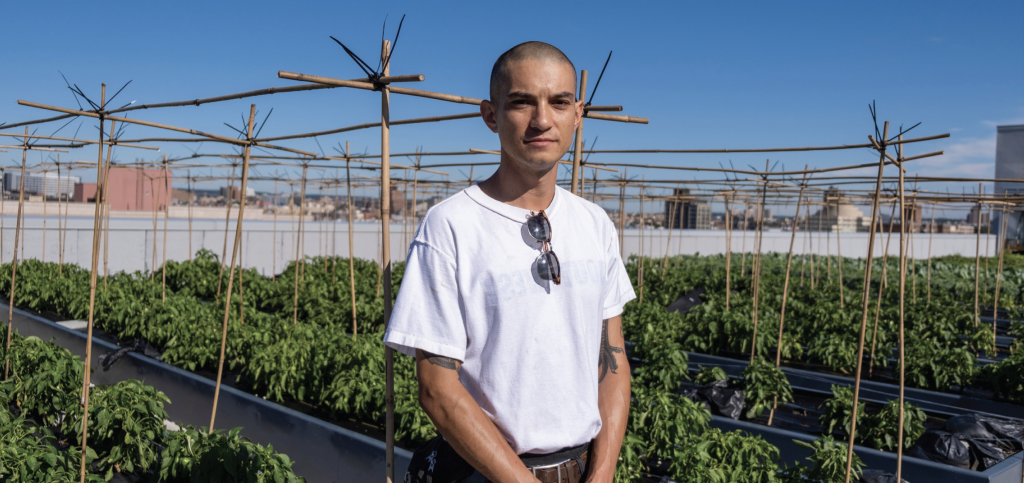
Finding a farm or a farmer anywhere near Third Avenue and 182nd Street, in the heart of the Bronx, would be like locating a hamburger at a vegan conference.
But, until the weather recently closed it until next spring, farm and farmer could be found a dozen or so stories up from the ground floor at the SBH Health and Wellness Center.
Here, on the rooftop farm, farmer Anthony Guevara worked a ½-acre plot of land throughout the spring, summer and early fall. He harvested about 40 or so pounds weekly from 27 rectangular beds of collard greens, turnips, radishes, kale, scallions, onions, microgreens, barley, spinach, parsley, kale, squash, okra and various herbs.
Some of the produce, like garlic bulbs, spent as long as a year hibernating in the ground before its harvest. Carrots, meanwhile, which grow beneath the ground, took three months to reach maturity. Squash, an early bloomer, needed just a couple of weeks.
The rooftop farm is a collaborative effort between SBH and Project Eats. The fresh produce grown here was available for sale weekly at the farm stand in the lobby of the Health and Wellness Center, and other farmer markets throughout the city. Through its free “farmacy” and food pantry programs, the rooftop farm hopes to reduce the food insecurity of those living in the neighborhood’s “food desert,” where fresh, healthy food is hard to come by.
Farmer Guevara traveled a rather circuitous route after college graduation before reaching his present occupation. With a degree in creative writing from Florida State University, he went to Jeonju, South Korea, a two-hour car ride from Seoul, as part of a cultural exchange program to teach English. He worked summers there on a farm. Here, he grew tangerines, cabbages for kimchi, melons, and various vegetables. He returned to America several years later after a stopover in Japan, growing everything from rice to different types of beans – supplanting his interest in teaching with a newfound love for farming. He took a job on a farm in Portland, Oregon – producing such international produce as Brazilian broccoli and Japanese eggplant – before moving to New York City and eventually teaming up with Project Eats with a mutual desire to bring fresh produce to areas that lack it. Before coming to the Bronx, he worked with Project Eats on a Wards Island farm.
Farming, it’s no secret, is physically taxing – not advisable for those with achy backs or squeamish about sweating under a hot sun. A typical day for Guevara involved watering, cutting, planting, spraying and pruning. While being so many feet off the ground kept out the rodents that plague many farms, he shared the area with four bee colonies, which created its own occupational hazard: the threat of being stung, which has materialized several times. “They go for the face,” he says, adding. “But I don’t want to vilify the bees. We’ve actually become good friends.”
Project Eats, established in 2009 by artist/filmmaker Linda Goode Bryant, a Guggenheim Fellow and a Peabody Award recipient, runs seven urban farms in four boroughs, distributing locally grown produce to under-resourced communities. This is critical in light of a recent U.S. Department of Agriculture study that reports that an estimated 11.1 percent of American households lack access to sufficient food to maintain a healthy lifestyle. This has only been further exacerbated by the pandemic which, according to a 2020 Brookings Institute study, found that over 17 percent of mothers with young children were not eating enough food because they could not afford it.
According to its website, Project Eats mission is “for everyone to have the opportunity – regardless of income – to live healthily and to thrive.” It views itself as a catalyst “in creating community-based enterprises that grow and distribute food and programs that inspire, engage, cultivate understanding and strengthen ties between neighbors,” with the end goal “to increase the wellbeing of individuals and to improve the social, economic, and cultural viability of their communities.”
This was more than enough to give farmer Guevara a reason to get up each morning and farm his small plot of land in the Bronx.




